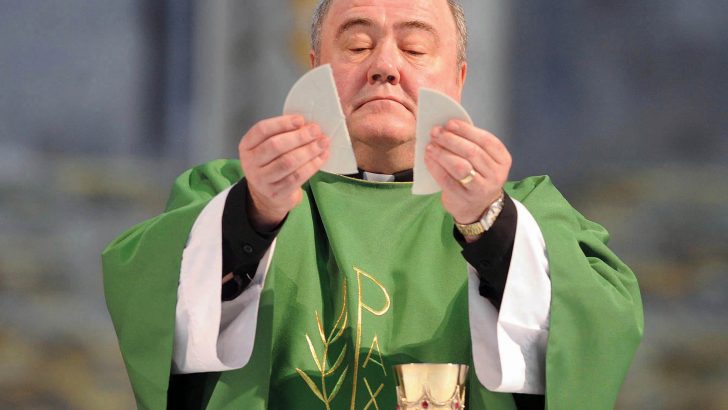Personal Profile
Fr Kevin McNamara is a man familiar with making the best of bad situations. “I have a philosophy that you have to grow where you’re planted. Every place that I have worked in, including my current place, is bringing great challenges,” he tells The Irish Catholic.
Parish priest of Moyvane, Co. Kerry, Fr McNamara’s introduction to the Faith harkened back to a time when the Faith was no less difficult. If anything, it was more so.
“I’d say my Faith was born in the village, in the sense that in bygone days, there used to be what we’d call ‘Station Masses’, and there was a priest in our village that used to do the Station Masses, Fr James Keane was his name. He was terrific in that he’d always take me to the Station Masses. So I suppose in that situation, I felt something beautiful about going to homes, even aside from missing school! Which was a lovely thing at the time,” he laughs. “Maybe I paid for it in later years, but the seed was planted at that particular time.”
Station Masses
Station Masses were necessitated during the years Ireland laboured under Penal Laws, which saw Mass said in random houses in order to avoid the detection of the authorities. Priests and the faithful risked much in their regular celebration of these hidden Masses.
While Fr McNamara’s experience of the Station Mass was born out of tradition rather than necessity, it had a similarly profound impact upon him, as did the priests he observed.
“But I suppose it was just the nature of their work and how close I felt that they were to God.”
Spurred on by their example, Fr McNamara was ordained in 1981.
“Three days after my ordination, my mother who had been ill in hospital, died with leukaemia. My first Mass was in the hospital ward in St Vincent’s, with a few cousins, and my dad, and my sister. Then my next mass was in Cooraclare, my first public Mass after ordination. My first funeral Mass was three days later in the same Church in Cooraclare, for the funeral of my mother.”
Fr McNamara’s entry into his priestly ministry was marred by deep suffering, but in keeping with the philosophy he would later develop, it provided him with an opportunity to grow where he was.
Priesthood
His early life in the priesthood was to be no less frustrating, with an assignment he never asked for or desired quickly coming his way.
“Well, I suppose I was blessed at the beginning – but I didn’t want to leave Ireland at the beginning, and there was two other guys ordained with me, and I said, “I’ll serve anywhere in Ireland, but if you’re sending me to England, please don’t send me to Liverpool.” The other guys got their request, and I went in for my interview to be told that I was not staying in Ireland, but that I was actually going to Liverpool,” he relates.
“I was upset, and quite angry, and disappointed.”
His reluctance to go to Liverpool was in part to do with the reputation it had for social unrest, as well as deep issues plaguing its communities. However, as is often the case with God, his vision was quickly transformed.
“But I must say, from the very first day that I went to Kirkby – it was an area that had a lot of personal problems at that time, there were a lot of demonstrations and a lot of social issues there – but from the moment I put my foot in Kirkby, there was something magic about it.”
He continues, “Ok, you hadn’t great numbers (in the parish) at the start, but you had a very warm people, and they were honed by the struggles of life and by not having work, and yet at the same time, there was a richness and a closeness to God there. I was very lucky to have that as an, if you like, extension of the seminary. It brought me into reality.”
The experience of priesthood that he hadn’t looked for was the experience that would transform him; an opportunity to live the life of Christ.
“I had to do things like call the bingo, go out into the club, mingle with people, getting people to come for various little celebrations and baptisms, etc. So I would say that that start there, even though my feelings going there were anything but good, that really kicked me off.”
“The challenge was how to bring Christ to people, and how to be that bridge to bring people to Christ, and bring yourself to Christ as well. Each place offers something of a glimpse down that road,” he says.
Road
That road ended with a worthy send-off. Having communicated the Parable of the Prodigal Son through regular plays for the children of the parish, the community at Kirkby saved up to offer Fr McNamara a ring, a pair of sandals, and a trip to the Holy Land.
“For a people to do that collecting in Kirkby was a major thing – to get a beautiful ring, a trip to the Holy Land, and a pair of sandals – they were doing the same for me as the father had done for the prodigal son as I was leaving.”
Now, Fr McNamara finds himself catering to the faithful in Moyvane, Co. Kerry. Catching the nation’s eye with his drive-through Masses celebrated during lockdown, he continues to try and grow where he is – while encouraging those in his charge to do the same.
“I want the Lord to continue to guide us and to help us and to keep us.”


 Fr Kevin McNamara
Fr Kevin McNamara 